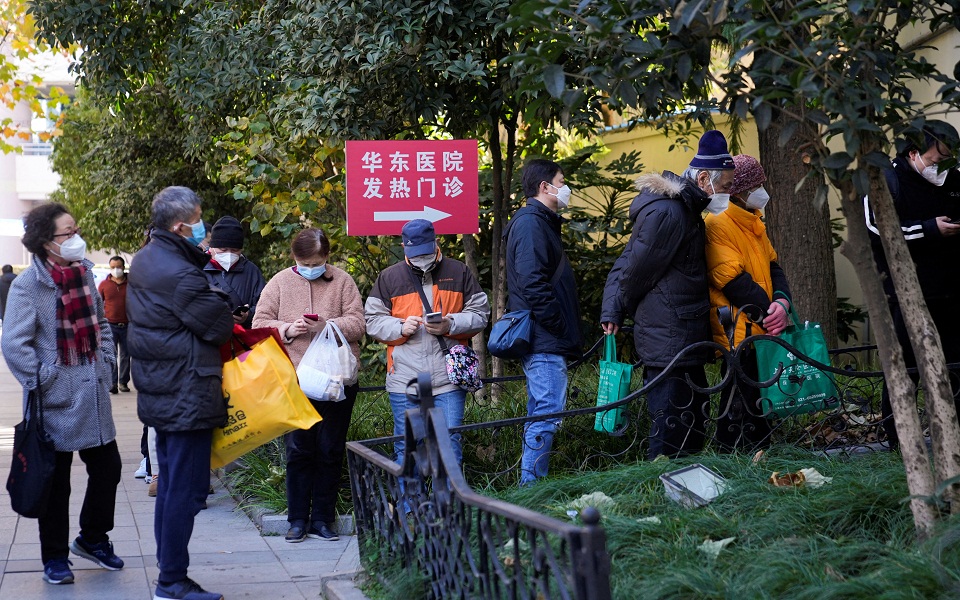
A Shanghai hospital has ordered its staff to prepare for a “tragic battle” with COVID-19 as half of the Chinese metropolitan area’s 25 million residents are expected to be infected by the end of the year as the virus spreads uncontrollably across China.
After mass protests and a steady rise in cases, China abruptly reversed course this month and began to abandon its “zero COVID-19” strategy, which has taken a heavy economic and psychological toll on its 1.4 billion people.
However, the official death toll in China since the start of the pandemic in early 2020 is 5,241, much lower than most other countries if the Chinese figures are real.
China reported no new COVID deaths for the second day in a row on Wednesday. though funeral home workers say demand has skyrocketed over the past week.increasing the commission.
The authorities, which have narrowed the criteria for COVID deaths, have confirmed 389,306 symptomatic cases.

Some experts say the official data has become an unreliable benchmark as China conducts fewer tests after restrictions are eased.
Shanghai Deji Hospital, in a post on its official WeChat account late Wednesday night, estimated that there were about 5.43 million cases in the city and that 12.5 million in China’s main commercial hub would be infected by the end of the year.
“This year Christmas Eve, New Year’s Eve and Lunar New Year [Κινεζική] They are expected to be unsafe in the New Year,” the hospital said.
“In this tragic battle, all of Greater Shanghai will fall and we will infect the entire hospital staff! We will infect the whole family! All our patients will be infected! We have no other choice and we cannot escape,” the hospital warned in a post.
In an effort to prevent the virus from spreading across China, Shanghai residents underwent a two-month quarantine that ended on June 1, with many of them losing income and having no access to basic necessities. Hundreds have died and hundreds of thousands have been infected in those two months.
More than 1 million people could die from COVID-19 in China next year, experts say.
The head of the World Health Organization said he was concerned about the rise in infections and supported the government to focus on vaccinating those most at risk.
WHO Director-General Tedros Adhanom Ghebreyesus told reporters that the agency needs more details from the Chinese authorities on the severity of the disease, hospitalization and intensive care unit requirements for a comprehensive assessment.
“Recruitment” of retired doctors
A change in China’s policy has taken China’s fragile healthcare system by surprise, with hospitals scrambling for beds and blood, pharmacies for drugs, and authorities scrambling to build specialized clinics.
Small towns away from the wealthy east and south coasts are especially vulnerable. Tongchuan, a city of 700,000 people in the northwestern province of Shaanxi, called on all doctors who have retired in the past five years to join the fight against COVID on Wednesday.
“Medical facilities at all levels in the city are under great pressure,” he said in a public statement.
State media reported that local governments struggled to deal with drug shortages while pharmaceutical companies worked overtime to shore up stocks.
Dongguan, a major city in southern China, said a total of 100,000 ibuprofen tablets have arrived in the city and will be distributed to 41 state-run pharmacies this week before they are made available for free, China’s Global Times reported.
In Wuhan, the city where the virus was first detected at the end of 2019, 3 million ibuprofen tablets have been supplied to medical facilities and retail pharmacies daily since December 17.
Authorities in Sanya on the southern island of Hainan have set up 18 pharmacies to dispense free medicines, while pharmacies in Zhukuhu are distributing up to 10 free pills a day to residents simply by showing identification.
mRNA vaccines for Germans
Germany announced that it has shipped its first batch of BioNTech 22UAy.DE COVID vaccines to China for initial administration to German emigrants. Berlin is pushing for more foreigners to take them.
These will be the first mRNA vaccines, considered the most effective against the disease, available in China.
Source: Reuters.
Source: Kathimerini
Anna White is a journalist at 247 News Reel, where she writes on world news and current events. She is known for her insightful analysis and compelling storytelling. Anna’s articles have been widely read and shared, earning her a reputation as a talented and respected journalist. She delivers in-depth and accurate understanding of the world’s most pressing issues.